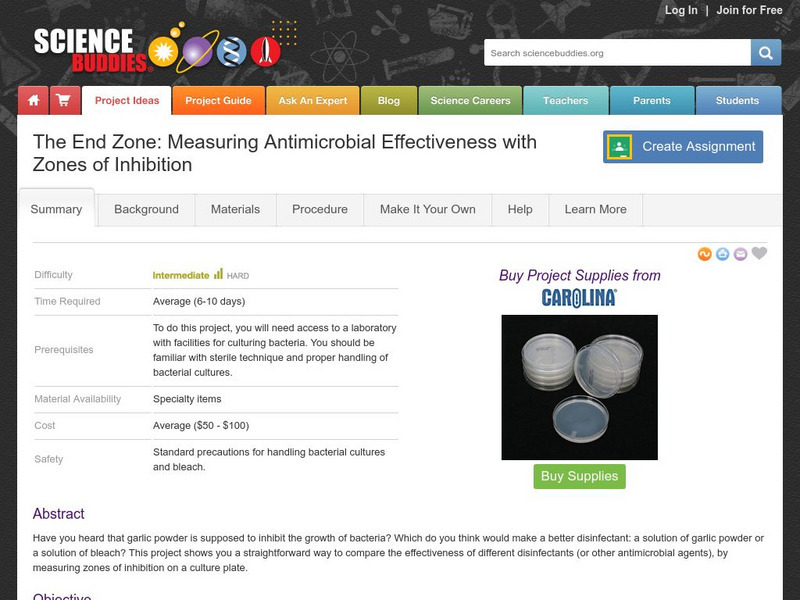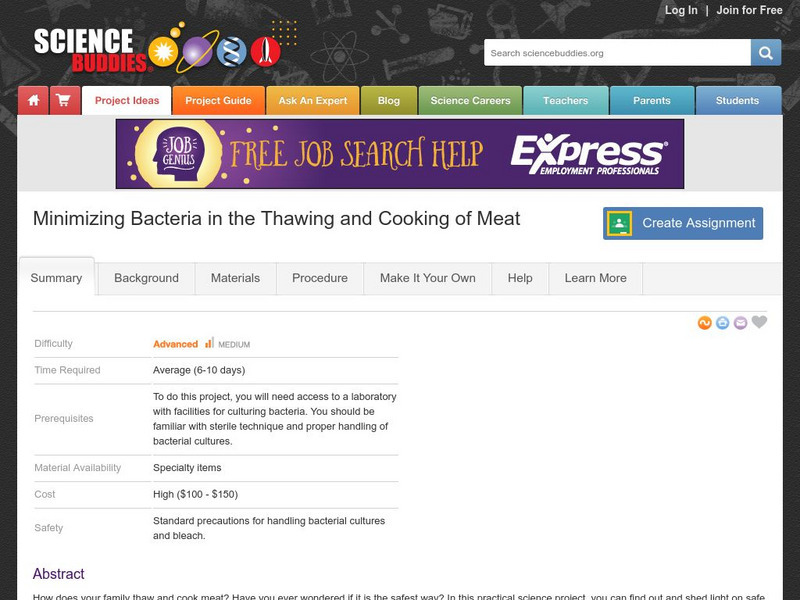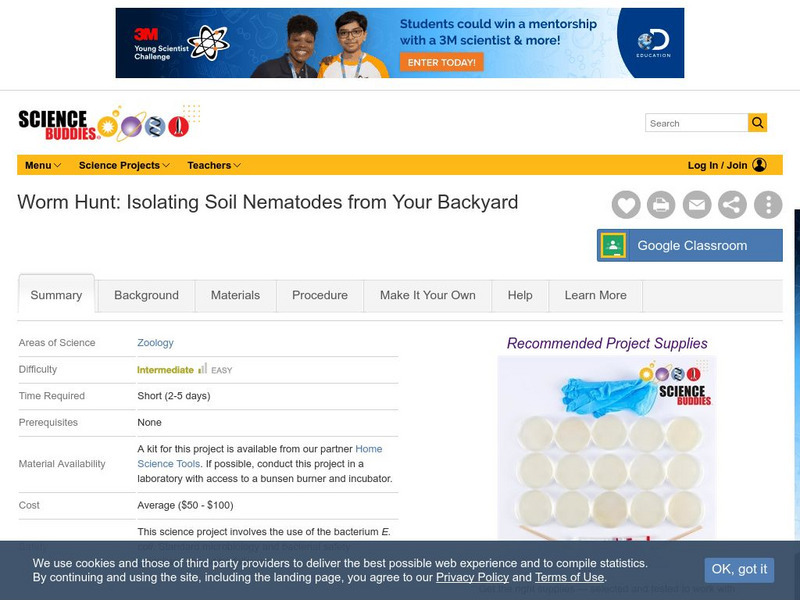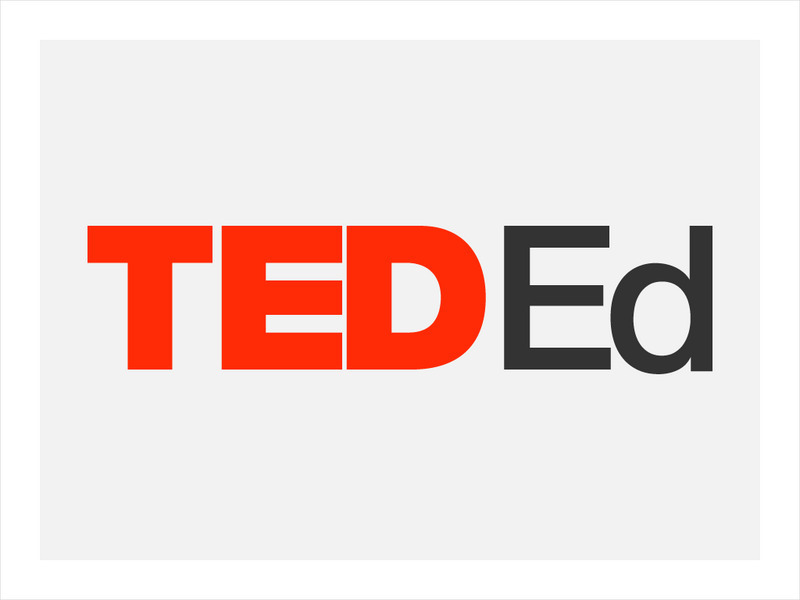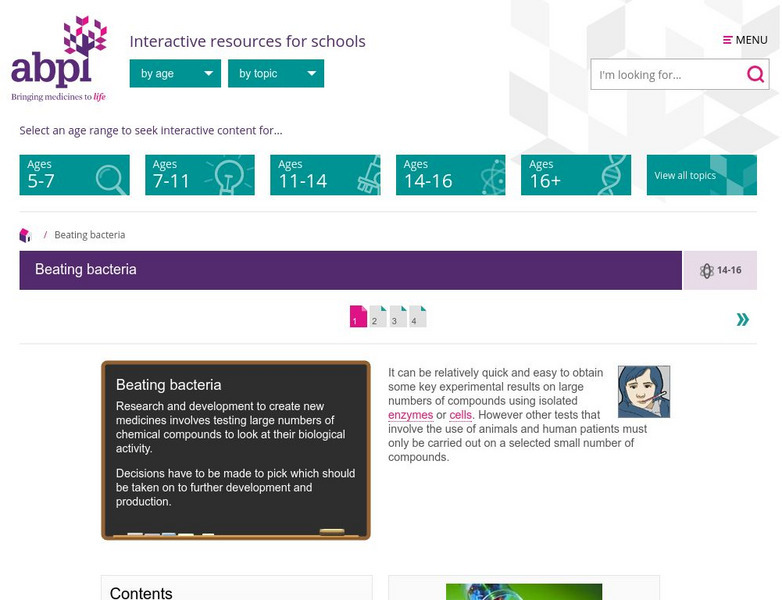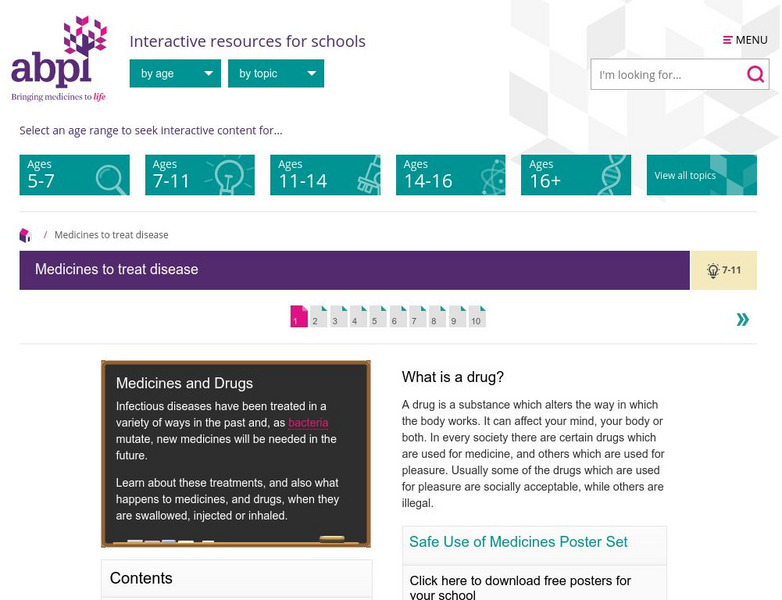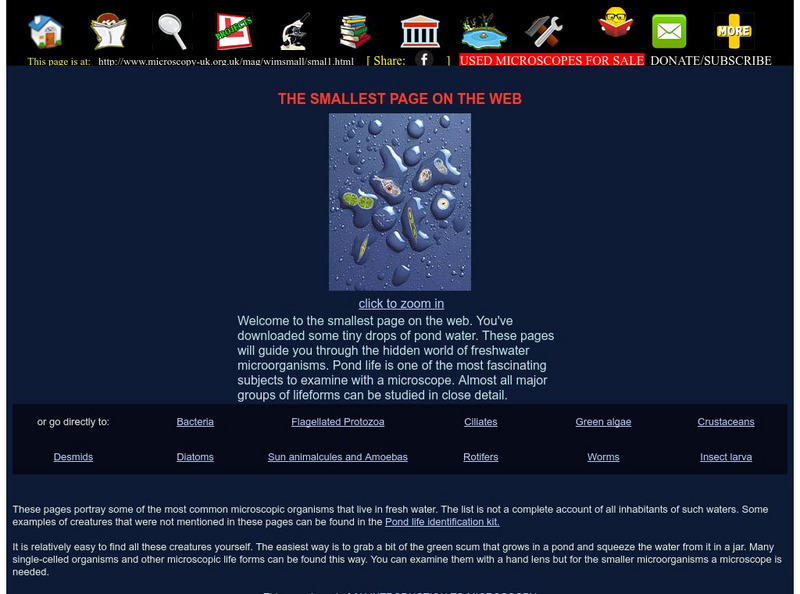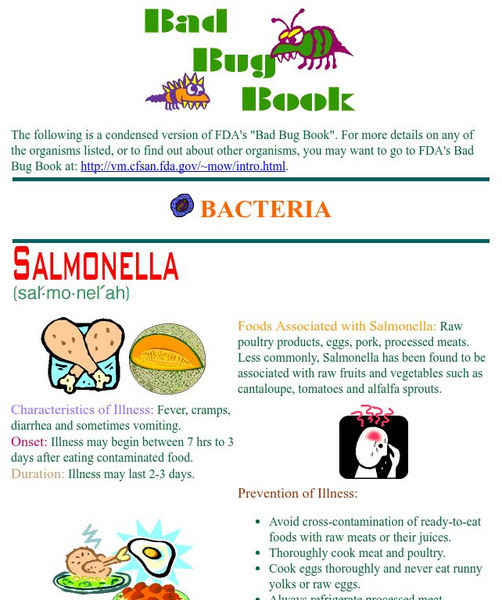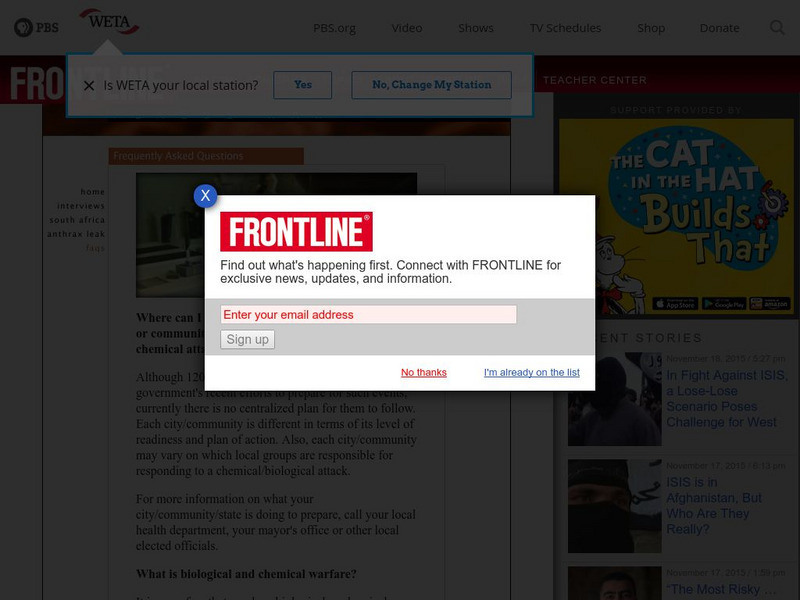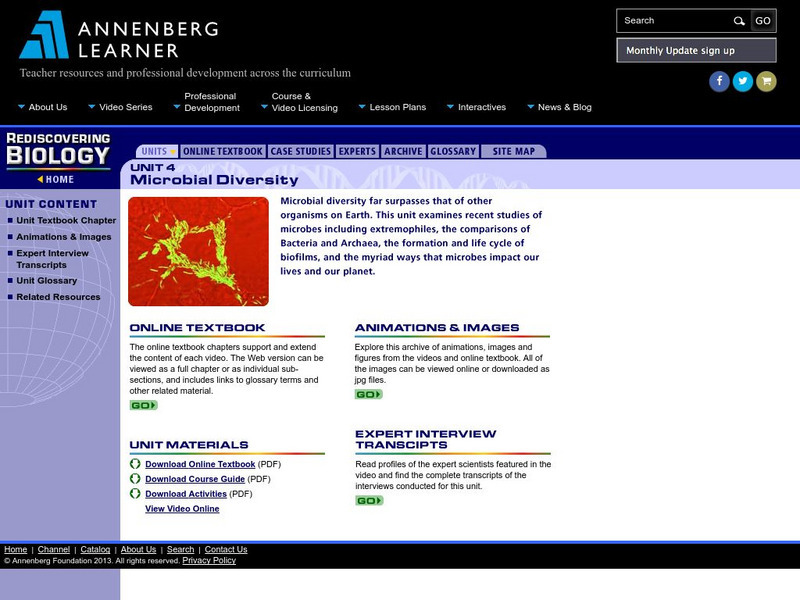Science Buddies
Science Buddies: Yogurt Cultures
Find out in this experiment how good bacteria can turn milk into a treat by investigating the optimal starter cultures for making yogurt from whole milk.
Science Buddies
Science Buddies: The End Zone: Measuring Antimicrobial Effectiveness
Antimicrobial agents are chemicals that are used against bacteria. There are many such agents available. Because there are many different situations where bacterial control is important, no antimicrobial agent is effective in all...
Science Buddies
Science Buddies: Minimizing Bacteria in the Thawing and Cooking of Meat
Here's a practical project that sheds light on safe practices in the kitchen. Use this information to determine which method of defrosting meat is safest and which method of cooking kills the most bacteria.
Science Buddies
Science Buddies: What Duration of Ultraviolet Exposure Kills Bacteria?
Ultraviolet light can damage DNA molecules. If a cell's DNA repair mechanisms can't keep up with the damage, mutations are the result. As harmful mutations accumulate, the cell eventually dies. How much ultraviolet light is too much for...
Science Buddies
Science Buddies: Bacterial Resistant Materials and the Best Disinfectant
If you'd rate yourself high on the bacteriophobia scale, just keep on scrolling down to the next project. Bacteria are all around us, and normally our body's defenses keep us blissfully unaware of them. If you don't mind finding out...
Science Buddies
Science Buddies: Worm Hunt: Isolating Soil Nematodes From Your Backyard
Nematodes, also called roundworms, are the most abundant animal on Earth and can be found in your back yard, playgrounds, and many other places. This lab involves isolating nematodes from several soil samples to discover the best...
Science Buddies
Science Buddies: Can Garlic Prevent Crown Gall?
Crown gall is a plant disease caused by the soil bacterium Agrobacterium tumefaciens. This project uses tomato plants to investigate whether garlic extract can prevent crown gall infection. Though this is a lengthy experiment, a...
Science Buddies
Science Buddies: Waste Not, Want Not: Use the Microbial Fuel Cell to Create Elec
Gross. What is that in the toilet? But maybe it's not just gross. Did you know there are bacteria that digest organic waste and create electrons? What if there was a way to collect those electrons to power a circuit? In this science fair...
TED Talks
Ted: Ted Ed: How Do Germs Spread? Why Do They Make Us Sick?
Germs are found on almost every surface we come in contact with, which makes it incredibly common for our bodies to be exposed to them. But why are some of these germs relatively harmless, while others can be fatal? The creators of this...
University of Missouri
Microbes in Action: Classroom Activities: Something's Glowing in My Petri Dish
Using microbiology techniques, students will explore the effect of iron on the fluorescence of several species of bacteria. Studying bacteria in an iron scarce environment allows students to see the fluorescence released. Lesson plan...
American Institute of Biological Sciences
Action Bioscience: Bacteria: More Than Pathogens
An explanation of the differences between bacteria and viruses. Further details are given showing that not all bacteria are bad.
The Association of the British Pharmaceutical Industry
Abpi: Infectious Diseases: Pathogens
An interactive, self-guided lesson on pathogens and microorganisms. This lesson has many descriptive animations as well as diagrams to help with understanding. There is a self-checking quiz at the end of the lesson.
The Association of the British Pharmaceutical Industry
Apbi: Beating Bacteria
A complete learning module on beating bacteria. Students read about how scientists fight bacteria, play a slide presentation about medicine research and development, watch an animation on antibiotic-resistant bacteria, and then answer...
The Association of the British Pharmaceutical Industry
Abpi: Medicines to Treat Disease
A series of slide show presentations about the treatment of infectious disease. Each focuses on one aspect of fighting bacteria. Also included are interactive animations illustrating body functions and how medicines work.
BioEd Online
Bio Ed Online: They're Everywhere: Bacteria
Bacteria are everywhere and can cause many different kinds of diseases. Bacteria are a major source of food contamination. Students will grow bacteria collected from different places and compare the results.
BioEd Online
Bio Ed Online: Safe Food Preparation
Do you always wash your hands before preapring food? Simple things that can be done during food preparation reduce the risk of food contamination. For this activity students learn how to safely prepare a fun treat in class- fruit ice cream.
BioEd Online
Bio Ed Online: The Science of Microbes: The Variety and Roles of Microbes
Learners learn about the four major groups of microbes and their characteristics, and the roles microbes have in the world. The instructional activity and PowerPoint slides can be downloaded. The included instructional video on the four...
Encyclopedia of Earth
Encyclopedia of Earth: Evolutionary Biology: Extremophile
Article describing some of the extreme environments where extremophile organisms can live, and giving examples from bacteria, archaea, flora, and fauna. (Published: November 26, 2010)
Microscopy UK
Microscopy Uk: The Smallest Page on the Web
Dive into a single drop of pond water to discover the microscopic world of freshwater organisms. Learn about protists, bacteria, and other tiny inhabitants that can only be seen under a microscope.
Other
Nsf International: Nsf Scrub Club
Keep yourself clean, kill bacteria, and stay healthy all year long by washing your hands (and under your fingernails) with warm soapy water. Play the "6 Steps Game" to learn how to properly clean your hands, meet the "villains" that...
Other
Ncagr: Bad Bug Book
A kids' version of the "bad bug" book. Staph is listed with a brief look at what foods are associated with this bacteria, what the symptoms are, how long it lasts and how to prevent it. Great for younger kids and good general info for...
PBS
Pbs: Plague War: Fa Qs
PBS provides an in-depth overview of both biological and chemical warfare in a FAQ format.
Annenberg Foundation
Annenberg Learner: Rediscovering Biology: Unit 4: Microbial Diversity
A complete learning module on microbial diversity that includes a downloadable textbook chapter, teacher guide, and lesson activities. The chapter can also be viewed online. In addition, there are animations, images, a video, and...
DOGO Media
Dogo News: 'Smart' Bandage Extracts Bacteria From Wounds
Read about the development of a new bandage that actually helps to remove bateria from wounds.



